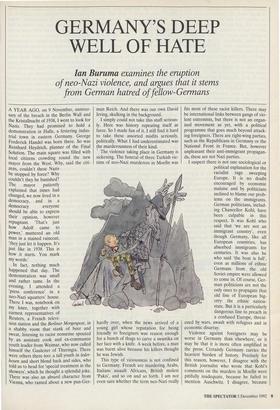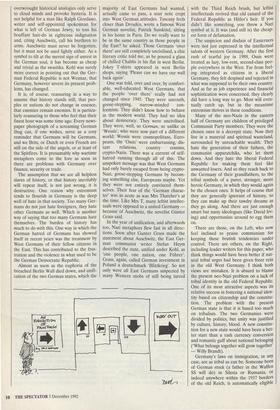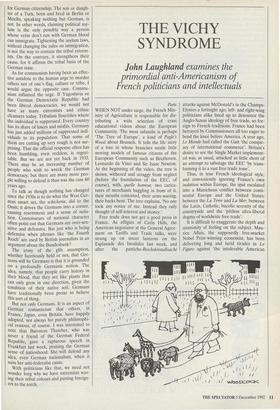GERMANY'S DEEP WELL OF HATE
Ian Buruma examines the eruption of neo-Nazi violence, and argues that it stems from German hatred of fellow-Germans A YEAR AGO, on 9 November, anniver- sary of the breach in the Berlin Wall and the Kristallnacht of 1938, I went to look for Nazis. They had promised to hold a demonstration in Halle, a festering indus- trial town in eastern Germany. George Frederick Handel was born there. So was Reinhard Heydrich, planner of the Final democracy everyone Should be able to express their opinion, however repugnant. 'That's just how Adolf came to power,' muttered an old man in a stained raincoat, .they just let it happen. It's just like in 1938. This is how it starts. You mark my words.'
In fact, nothing much happened that day. The demonstration was small and rather tame. In the evening, I attended a 'press conference' in a neo-Nazi squatters' house. There I was, notebook on my knee, together with earnest representatives of Reuters, a French televi- sion station and the Berliner Morgenpost, in a shabby room that stank of beer and sweat, listening to racist nonsense spouted by an assistant cook and ex-communist youth leader from Weimar, who now called himself the Gauleiter of Thuringia. There were others there too: a tall youth in leder- hosen and short blond back and sides, who told us to head for 'special treatment in the showers', which he thought a splendid joke. There was also an absurd character from Vienna, who ranted about a new pan-Ger- man Reich. And there was our own David Irving, skulking in the background.
I simply could not take this stuff serious- ly. Here was history repeating itself as farce. So I made fun of it. I still find it hard to take these assorted misfits seriously, politically. What I had underestimated was 91e murderousness of their kind. The violence taking place in Germany is sickening. The funeral of three Turkish vic- tims of neo-Nazi murderers in Moelln was hardly over, when the news arrived of a young girl whose reputation for being friendly to foreigners was reason enough for a bunch of thugs to carve a swastika on her face with a knife. A week before, a man was burnt alive because his killers thought he was Jewish.
This type of viciousness is not confined to Germany. French are murdering Arabs, Italians assault Africans, British molest `Pakis', and so on and so forth. I am not even sure whether the term neo-Nazi really fits most of these racist killers. There may be international links between gangs of vio- lent extremists, but there is not an organ- ised movement as yet, with a political programme that goes much beyond attack- ing foreigners. There are right-wing parties, such as the Republicans in Germany or the National Front in France. But, however unpleasant their anti-immigrant propagan- da, these are not Nazi parties.
I suspect there is not one sociological or political explanation for the racialist rage sweeping Europe. It is no doubt encouraged by economic malaise and by politicians inclined to blame our prob- lems on the immigrants. German politicians, includ- ing Chancellor Kohl, have been culpable in this respect. It was Kohl who said that 'we are not an immigrant country', even though Germany, like all European countries, has absorbed immigrants for centuries. It was also he who said 'the boat is full', even as millions of ethnic Germans from the old Soviet empire were allowed to come in. Of course, Ger- man politicians are not the only ones to propagate that old line of European big- otry: the ethnic nation- state. But it is a particularly dangerous line to preach in a confused Europe, threat- ened by wars, awash with refugees and in economic disarray.
Violence against foreigners may be worse in Germany than elsewhere, or it may be that it is more often amplified in the press. Certainly Germany carries the heaviest burden of history. Precisely for this reason, however, I disagree with the British journalist who wrote that Kohl's comments on the murders in Moelln were pitifully inadequate, because he failed to mention Auschwitz. I disagree, because overwrought historical analogies only serve to cloud minds and provoke hysteria. It is not helpful for a man like Ralph Giordano, writer and self-appointed spokesman for what is left of German Jewry, to toss his bouffant hair-do in righteous indignation and, citing Auschwitz, call his brethren to arms. Auschwitz must never be forgotten, but it must not be used lightly either. As a symbol to tilt at the merest sign of unrest in the German soul, it has become as cheap and trivial as the swastika. Kohl was surely more correct in pointing out that the Ger- man Federal Republic is not Weimar, that Germany, however severe its present prob- lems, has changed.
It is, of course, reassuring in a way to assume that history stands still, that peo- ples or nations do not change in essence, that enemies remain enemies. It is particu- larly reassuring to those who feel that their finest hour was some time ago. Every news- paper photograph of a screaming German thug can, if one wishes, serve as a cosy reminder that Germans will be Germans, and we Brits, or Dutch or even French are still on the side of the angels, or at least of the Spitfires. It is presumably why wartime metaphors come to the fore as soon as there are problems with Germany over finance, security or trade.
The assumption that we are all helpless slaves of history, or that history inevitably will repeat itself, is not just wrong, it is destructive. One reason why extremism tends to flourish in Germany is the deep well of hate in that society. Too many Ger- mans do not just hate foreigners, they hate other Germans as well. Which is another way of saying that too many Germans hate themselves. The burden of history has much to do with this. One way in which the German hatred of Germans has showed itself in recent years was the treatment by West Germans of their fellow citizens in the East. This has contributed to the frus- tration and the violence in what used to be the German Democratic Republic.
Almost as soon as the euphoria of the breached Berlin Wall died down, and unifi- cation of the two German states, which the majority of East Germans had wanted, actually came to pass, a sour note crept into West German attitudes. Tuscany feels closer than Dresden, wrote a famous West German novelist, Patrick Susskind, sitting in his home in Paris. Do we really want to be in the same country as those people in the East? he asked. Those Germans 'over there' are still completely uncivilised, a chic literary critic told me, as he poured a glass of chilled Chablis in his flat in west Berlin. Jokey T-shirts appeared in west Berlin shops, saying 'Please can we have our wall back again'.
One was told, over and over, by comfort- able, well-educated West Germans, that the people 'over there' really had not changed since 1945. They were uncouth, goose-stepping, narrow-minded con- formists. They didn't know how to behave in the modern world. They had no idea about democracy. They were uncivilised. They were, well, so German, so unlike us Wessis', who were now part of a different world; Wessis were cosmopolitans, Euro- peans, the `Ossis' were embarrassing, dis- tant relations, country cousins, crypto-Nazis. There was a current of self- hatred running through all of this. The unspoken message was that West Germans had only barely escaped from being crypto- Nazi, goose-stepping Germans by becom- ing something else, Europeans maybe. Yet they were not entirely convinced them- selves. Their fear of the 'German charac- ter' was as acute as was Mrs Thatcher's at the time. Like Mrs T, many leftist intellec- tuals were opposed to a united Germany — because of Auschwitz, the novelist Gunter Grass said.
In the year of unification, and afterwards too, Nazi metaphors flew fast in all direc- tions. Soon after Gunter Grass made the statement about Auschwitz, the East Ger- man communist writer Stefan Heym described the state, unified under Kohl, as 'one people, one nation, one Fiihref. Grass, again, called German investment in Poland a deutschmark 'Blitzkrieg'. So not only were all East Germans suspected by many Western snobs of still being tarred with the Third Reich brush, but leftist intellectuals revived that old canard of the Federal Republic as Hitler's heir. If you didn't like something, you threw a Nazi symbol at it. It was (and still is) the cheap- est form of defamation.
The suspicion and disdain of Easterners were not just expressed in the intellectual salons of western Germany. After the first rush of tearful joy in 1989, Ossis were treated as lazy, low-rent, second-class peo- ple everywhere in the West. Far from feel- ing integrated as citizens in a liberal Germany, they felt despised and rejected in what was supposed to be their own country. And as far as job experience and financial sophistication were concerned, they clearly did have a long way to go. Most will even- tually catch up, but in the meantime extremism thrives in these conditions.
Many of the neo-Nazis in the eastern half of Germany are children of privileged Communist Party members. They were the chosen ones in a decrepit state. Now they live in a material and spiritual wasteland, surrounded by unreachable wealth. They hate the generation of their fathers, the communist apparatchiks, who let them down. And they hate the liberal Federal Republic for making them feel like unwanted losers. And so they reach back to the Germany of their grandfathers, to the tribal symbols of a purer, stronger, more heroic Germany, in which they would again be the chosen ones. It helps of course that they are generally ignorant of history, so they can make up their tawdry dreams as they go along. And there are just enough smart but nasty ideologues (like David Irv- ing) and opportunists around to egg them on.
There are those, on the Left, who now feel inclined to praise communism for keeping these brutish tendencies under control. There are others, on the Right, including leader writers for this paper, who think things would have been better if nat- ural tribal urges had been given freer rein in the old West Germany. I think both views are mistaken. It is absurd to blame the present neo-Nazi problem on a lack of tribal identity in the old Federal Republic. One of its most attractive aspects was its relative success in fostering a national iden- tity based on citizenship and the constitu- tion. The problem with the present German state is that it is based too much on tribalism. The two Germanies were divided by politics, but unity was justified by culture, history, blood. A new constitu- tion for a new state would have been a bet- ter start than a rash currency conversion and romantic guff about national belonging (What belongs together will grow together' — Willy Brandt).
Germany's laws on immigration, in any case, are as tribal as can be. Someone born of German stock (a father in the Waffen SS will do) in Silesia or Rumania, or indeed anywhere within the 1937 borders of the old Reich, is automatically eligible for German citizenship. The son or daugh- ter of a Turk, born and bred in Berlin or MoeIln, speaking nothing but German, is not. In other words, claiming political asy- lum is the only possible way a person whose veins don't run with German blood can immigrate. Tightening the asylum laws, without changing the rules on immigration, IS not the way to contain the tribal extrem- ists. On the contrary, it strengthens their cause, for it affirms the tribal basis of the German state.
As for communism having been an effec- tive antidote to the human urge to murder others not of one's flag, culture or tribe, I would argue the opposite case. Commu- nism inflamed the urge. If Yugoslavia or the German Democratic Republic had been liberal democracies, we would not have as many extremists and ethnic cleansers today. Tribalism flourishes where the individual is suppressed. Every country has its share of losers and misfits. Germany has just added millions of suppressed indi- viduals to its population. That some of them are cutting up very rough is not sur- prising. That the official response often has been bumbling, even reckless, is regret- table. But we are not yet back in 1933. There may be an increasing number of people who wish to wreck the German democracy, but there are many more peo- ple willing to defend it than was the case 60 years ago.
To talk as though nothing has changed since the 1930s is to do what the West Ger- man smart set, the schickeria, did to the Ossis; it drives the Germans into a corner, causing resentment and a sense of isola- tion. Connoisseurs of national character often point out that Germans are over-sen- sitive and defensive. But just who is being defensive when phrases like 'the Fourth Reich' are used by British journalists in an argument about the Bundesbank?
The irony of the glib assumption, whether facetiously held or not, that Ger- mans will be Germans is that it is grounded on a profoundly Germanic notion. The Idea, namely, that people carry history in their blood, that they are like plants that can only grow in one direction, given the condition of their native soil. Germans have traditionally been prone to believe this sort of thing. But not only Germans. It is an aspect of German romanticism that others, in France, Japan, even Britain, have happily adopted, not always for purely philosophi- cal reasons, of course. I was interested to note that Baroness Thatcher, who was never a friend of the German Federal Republic, gave a rapturous speech in Frankfurt last week, praising the German sense of nationhood. She will defend any idea, even German nationalism, when it suits her anti-federalist cause.
With politicians like that, we need not wonder long why we have extremists wav- ing their tribal colours and putting foreign- ers to the torch.












































































 Previous page
Previous page